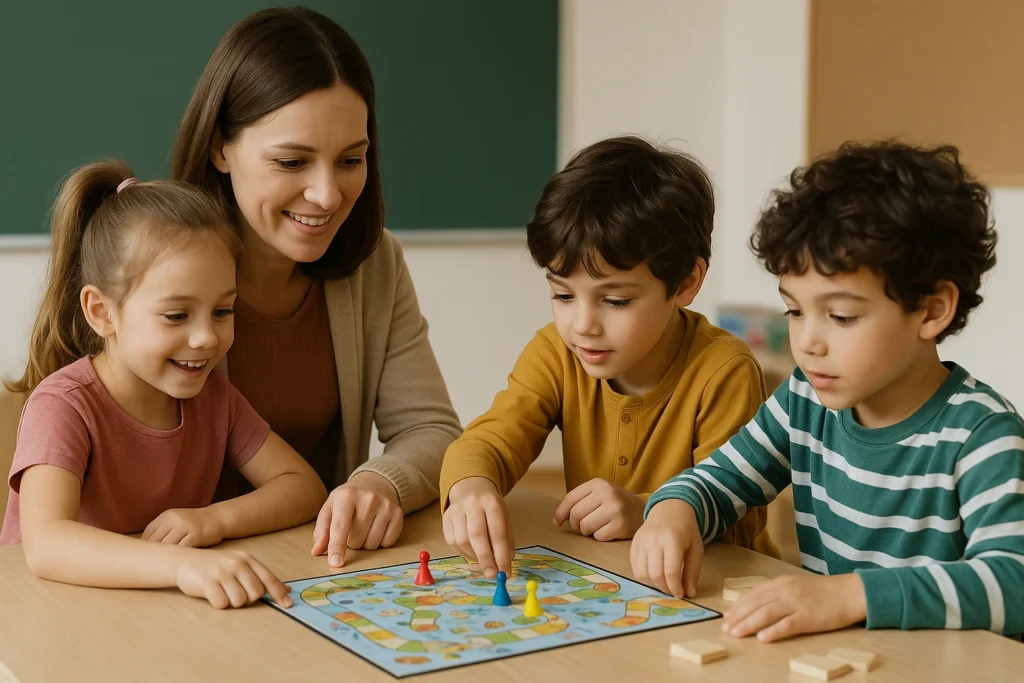Getting your child to practice speech sounds feels impossible sometimes. You try flashcards or drills, but they tune out within minutes. Truth be told, kids see it as work on top of school, but speech therapy games might do the trick.
Games successfully grab kids’ attention and keep them engaged without feeling like practice. A child who refuses to repeat words will gladly spend 30 minutes playing without even noticing they’re working on language skills.
We’ll show you board games that build communication, online options for language development, everyday moments you can use for practice, and outdoor activities that encourage talking. These approaches help children learn while they’re having fun.
Ready to see what you already have at home? Let’s get started.
Board Games That Build Communication Skills

Board games offer something special for speech therapy. Kids take turns, describe what they see, and talk through their moves without realizing they’re practicing communication skills.
Here are some options that work well:
Classic Games You Already Own
Candy Land and Chutes and Ladders help younger children practice color names, counting, and simple directions. As kids move their pieces, they naturally describe where they’re going and what’s happening on the board.
Note that these games work great for children ages 3-6 who are building basic language skills.
Games for Back-and-Forth Conversation
Guess Who teaches kids to ask questions and listen carefully to answers.
Each round builds skills in forming clear questions and processing spoken information. The game helps your child learn how to narrow down choices by talking through what they see. This also helps with language development and problem-solving at the same time.
Strategy Games That Get Kids Describing
Battleship requires players to give specific directions using words like “across” and “down.” Children practice articulation while explaining their strategy, and the game keeps them talking for 20-30 minutes straight.
Our experience tells us that older students love this one because it feels more grown-up than typical preschool games.
Pick one that matches your child’s age and interests, then watch how naturally the conversation flows. Now let’s look at what technology can add to your practice routine.
Online Games and Apps for Language Development
Screen time gets a bad reputation. The right apps can help, though. They turn tablets into speech therapy tools that target specific sounds and track your child’s progress.
These are the types that work best:
- Articulation practice: Smarty Ears offers apps where kids hear words, repeat them, and get instant feedback. In such cases, children work on target articulation without realizing they’re practicing. The technology makes everything feel like play instead of work.
- Vocabulary building: Games like Language Builder and Word Vault use pictures and spoken words to teach new meanings. These games allow your child to hear a word and see what it represents. This approach works well for children with language disorders who need extra repetition to learn.
- Story-based learning: Kids listen to tales and answer questions about what they heard. The format builds comprehension skills while keeping them engaged. On top of that, colorful characters help develop both listening and speaking abilities at the same time.
- Free browser options: Educational sites offer no-cost games that require talking or making choices. This means you can practice right away without downloading anything or spending money on apps.
Download one or two to start. See which ones your child asks to play again. You don’t always need screens to sneak in learning, though.
Everyday Activities That Sneak in Practice

Speech therapy doesn’t stop when you leave the clinic or close the app. If you notice carefully, your daily routines already create tons of chances to practice.
Take cooking, for example. When kids help you make dinner, they’re learning to follow spoken directions and name ingredients. Also, they describe textures like “sticky” or “crunchy” without even thinking about it. When a child uses new words while cooking, it helps them remember better than any flashcard drill.
Car rides work great too. You can ask your child to name everything they see in a certain color, or have them make up a story about where you’re headed.
Grocery shopping? Same idea. Let your child help find items on your list. They’ll read words, count apples, and tell you what the family needs for the week.
The best part of it all is that your child has no idea this is speech therapy. They think they’re just hanging out with you. The language practice happens naturally, without any pressure or formal setup.
Hold on, it’s time to head outside, where movement and fresh air make practice even more fun.
Outdoor Games for Speech and Language

Outdoor play does double duty for speech therapy. Physical activity loosens kids up and makes them more talkative than sitting at a table ever could.
These activities get kids moving while they practice:
- Nature scavenger hunts: Give kids a list of things to find based on color or sound. They practice vocabulary and complete sentences when they tell you what they discovered. You will notice that younger children search for simple items while older students hunt for more complex things.
- Red Light, Green Light: Your child listens carefully to commands and responds with movement. The game builds skills in processing spoken directions quickly. It also helps with self-control, which is important for kids who struggle with social communication and taking turns.
- Chalk talk activities: Draw letters, words, or pictures on the sidewalk, then have kids jump to each one. They say what they see while hopping, which works on sounds and word recognition. Believe us, students love this one because it feels more like recess than practice.
- Catch and chat: Players name something from a category before catching the ball. Alongside that, you’re building language skills while getting exercise. We suggest you try categories like foods, animals, or things at school to keep the game interesting across multiple rounds.
Head outside for 20 minutes, and you’ll be surprised how much talking happens naturally.
Watch Your Child’s Progress Unfold
Small wins add up faster than you think. Your child might struggle with certain sounds today, but games make practice consistent. Within weeks, you’ll notice they’re using longer sentences during board games or asking clearer questions while playing outside.
Keep in mind that some days will feel like breakthroughs. Other days feel stuck. That’s normal for language development. The goal is to keep practice fun so your child stays motivated.
Smarty Ears offers apps and resources designed for speech therapy at home and in the classroom. Our tools help parents and teachers support children with communication disorders through technology that keeps kids engaged.
Visit our site to find more solutions that make speech and language practice something children look forward to.
